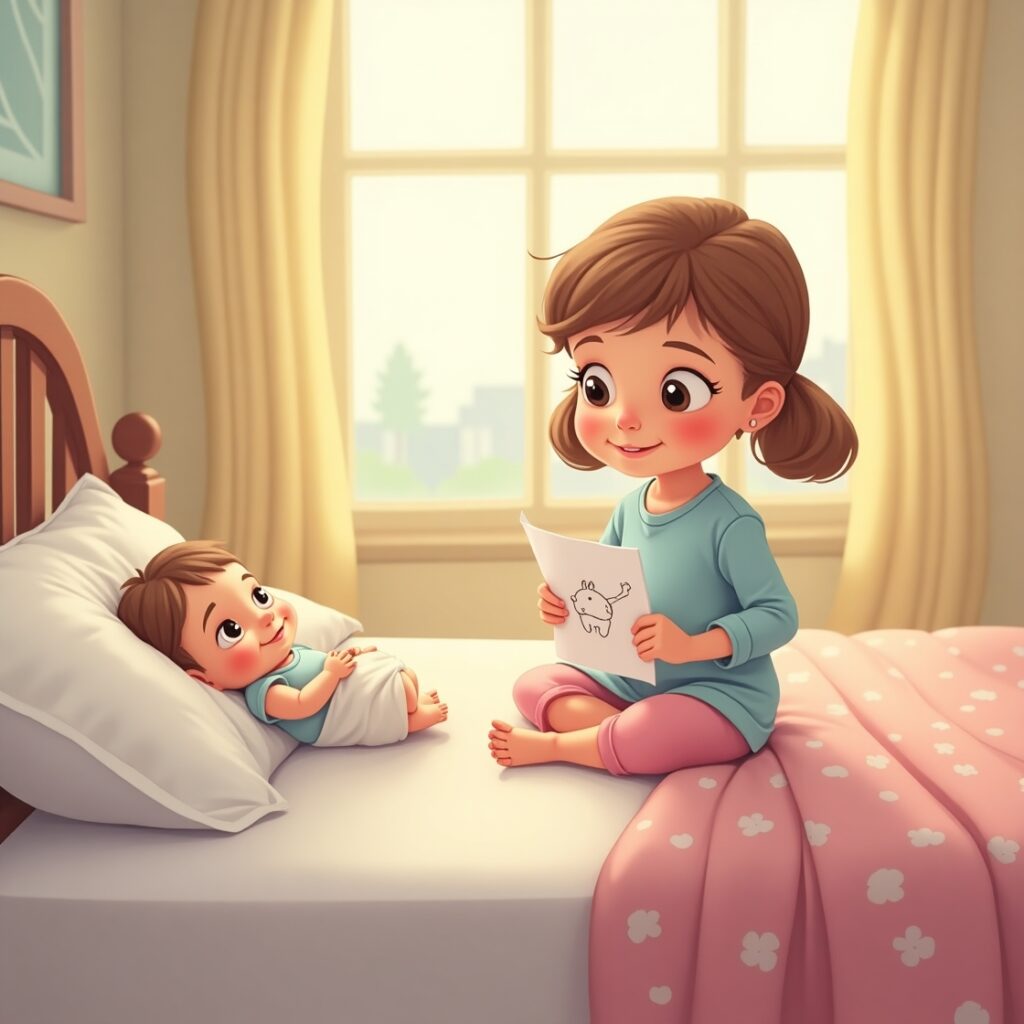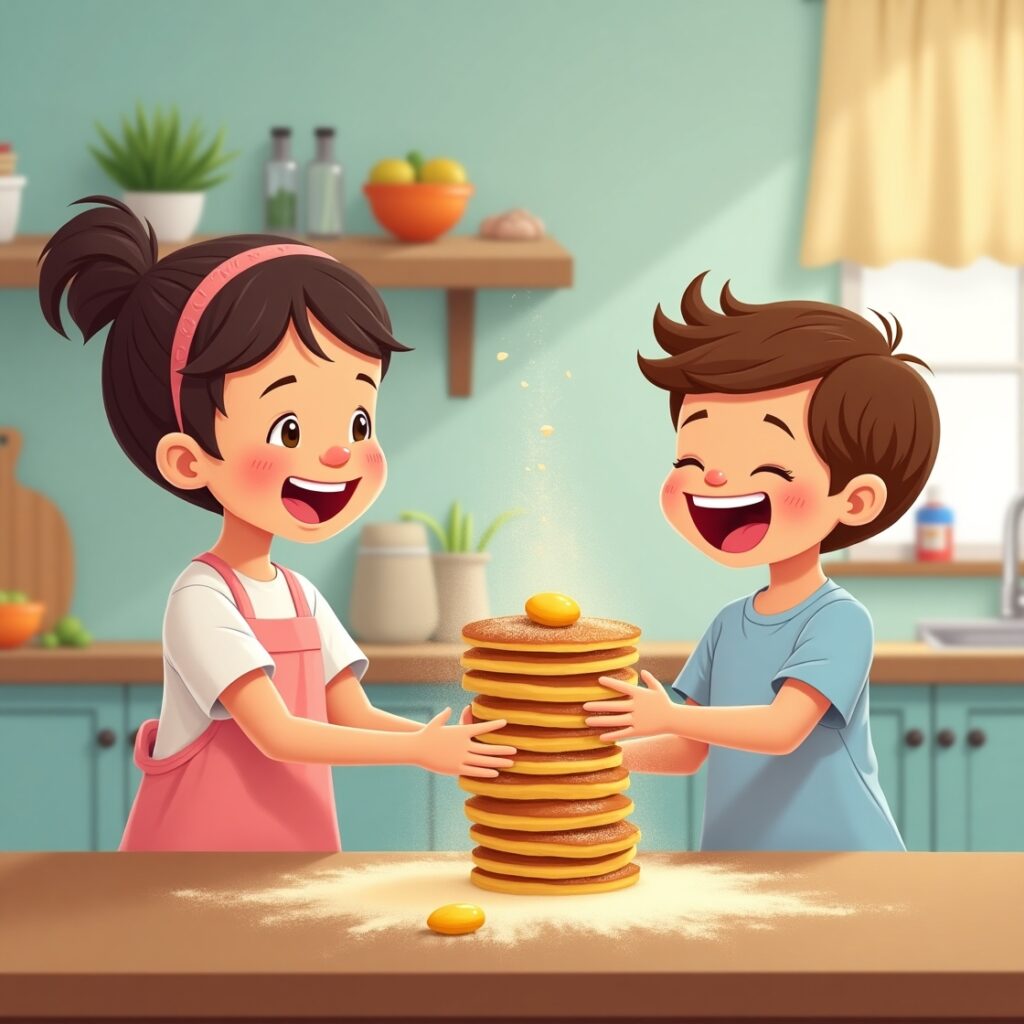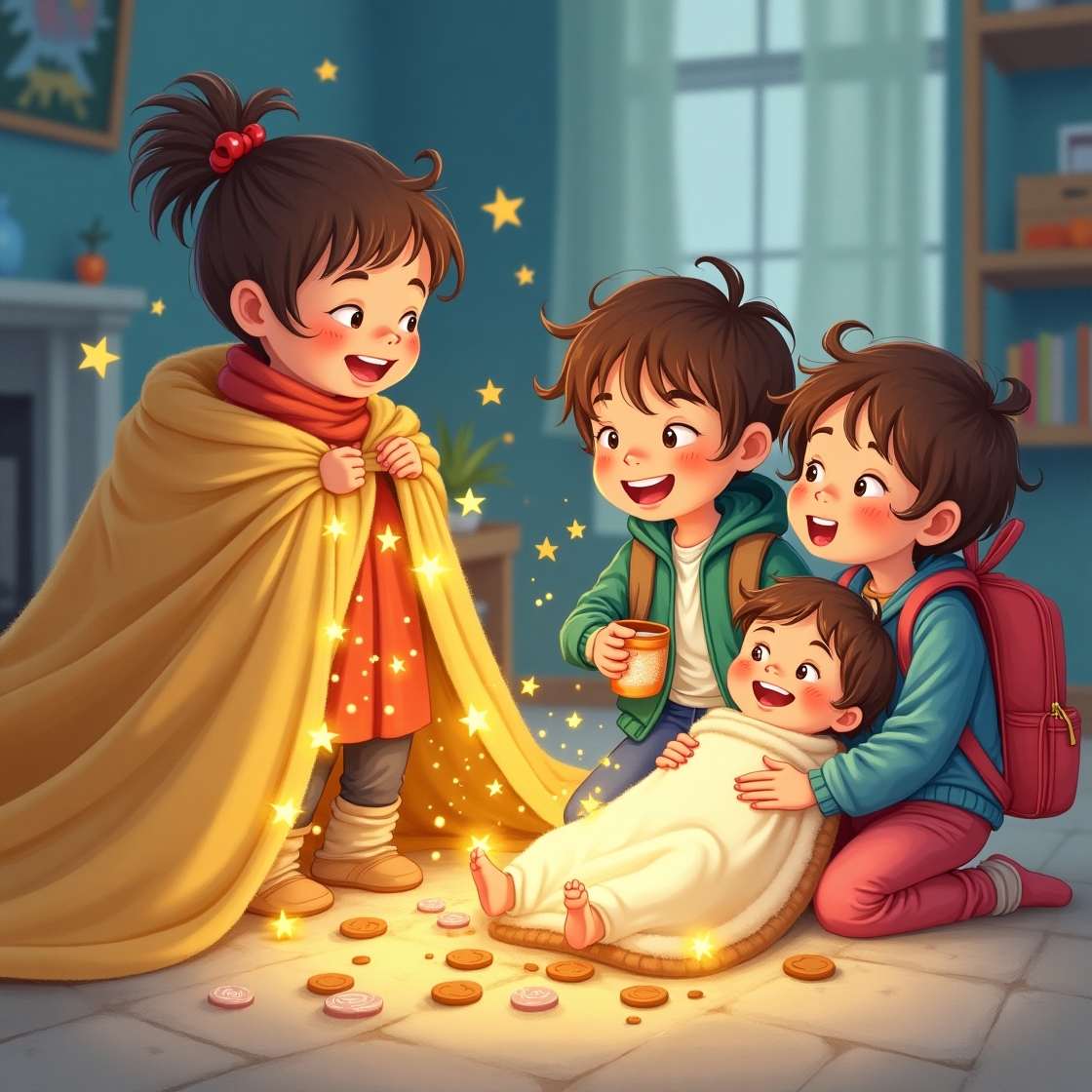Family is where a child’s first stories begin. From shared meals and cozy bedtime routines to arguments over toys and heartfelt hugs, family life is full of everyday magic. Family & Sibling Stories help children understand their own feelings, relationships, and the value of love, forgiveness, and support all in a way they can relate to.
These stories are not just fun to read they’re powerful learning tools. Whether it’s about helping a younger sibling, missing a grandparent, or dealing with a new baby in the house, family stories help children process real-life emotions and situations.
Why Are Family & Sibling Stories So Popular with Kids?
Here are a few key reasons why children love stories that focus on family and siblings:
1. They Feel Familiar
Children love stories they can see themselves in. Family-based stories reflect their daily lives whether it’s helping set the table, going on a family vacation, or fighting (and making up) with a sibling.
2. They Teach Emotional Skills
These stories gently teach lessons about sharing, empathy, patience, forgiveness, and love. Kids see characters navigate real emotions just like they do.
3. They Promote Bonding
When children read or hear stories about family life, they begin to better understand their own family dynamics and appreciate their relationships more deeply.
4. They Encourage Positive Behavior
Seeing characters handle family problems or sibling conflicts encourages children to make better choices in their real lives.
Story 1: “Luna and the Baby Who Took Her Place”
A heartfelt story about jealousy, change, and learning that love grows.
Luna Patel was five years old and used to being the center of everything.

Every morning, she’d wake up to Mama’s soft voice saying, “Good morning, sunshine,” while brushing her hair into perfect little braids. Papa would always peek into her room before work, give her a kiss on the forehead, and ask, “How’s my little artist today?”
Luna had her own art corner, her own shelf in the fridge for snacks, and her own special song that Mama sang only for her at bedtime.
But then came the day Mama and Papa came home from the hospital… with someone else.
A baby.
A loud, wrinkly, always-crying baby they named Arin.
The Beginning of Change
Everything changed overnight.
Mama was too tired to brush Luna’s hair. “Just a quick ponytail today,” she’d say, bouncing Arin on her shoulder.
Papa stopped asking about her drawings. Instead, he tiptoed around the living room, whispering, “Don’t wake the baby.”
Even her bedtime song had disappeared. Now it was lullabies for Arin, while Luna lay silently in bed, staring at the ceiling.
Luna didn’t hate her baby brother. Not really. But she did hate the way everyone acted like he was some sort of king in diapers.
One afternoon, when Luna walked into the living room holding a picture she had drawn of the whole family (with herself wearing a superhero cape), Mama didn’t even look up. She was trying to get Arin to burp.
“Later, sweetie,” Mama mumbled.
Luna stared at her drawing.
Then slowly, quietly, she folded it in half… then in half again… until it was small enough to hide in her pocket.
Operation: Ignore the Baby
Luna decided she was done trying. If no one cared about her, fine. She’d just live her life and pretend Arin didn’t exist.
She stopped talking during breakfast. She didn’t show Papa her drawings anymore. She didn’t ask Mama to read her bedtime stories. When visitors came to see the baby, Luna stayed in her room.
One evening, during bath time, she even told her favorite rubber duck, “You’re lucky you don’t have a baby brother.”
The Rainy Day That Changed Everything
One Saturday, the rain poured nonstop. The sky was gray, and everything felt even quieter than usual.
Luna sat in her art corner, drawing a stormy sky with a lonely girl under an umbrella. She was almost done when she heard it a soft little coo followed by a giggle.
She turned around.
Arin was on a blanket in the middle of the living room, kicking his tiny legs and… staring at her.
“Gaaa” he said, then flailed his arms like he wanted to fly.
Luna blinked.
Then, without really thinking, she picked up her purple crayon and drew a tiny baby beside the girl with the umbrella.
She glanced at Arin again. He smiled.
She frowned. “You’re not that cute,” she whispered.
He giggled louder.
Luna stood up slowly and tiptoed closer. She sat cross-legged beside his blanket. His eyes locked on her face like she was the most interesting thing in the world.
“What?” she asked, crossing her arms.
He made a squeaky laugh and tried to reach for her braid.
Luna blinked again… and something strange happened inside her chest. Like a soft bubble popping. She didn’t feel angry.
She felt… curious.
A New Kind of Big Sister
The next day, when Papa came to check on her drawings, Luna pointed to a new one. It was of a big sister in a superhero cape holding a baby wrapped in a blanket.
Papa smiled wide. “That’s beautiful, Luna. Is that Arin?”
Luna nodded. “He’s my sidekick now.”
Later, when Mama was busy cooking, Luna sat beside Arin with a stack of board books. She showed him pictures and made silly noises. He squealed every time she did the duck voice.
And that night for the first time in weeks Mama sat on the edge of her bed.
“I miss our bedtime song,” Luna whispered.
Mama kissed her forehead. “I was hoping you’d say that.”
So she sang. Luna closed her eyes as the familiar melody filled the room, soft and warm. From the nursery next door, Arin’s tiny sighs followed like backup music.
From One to Two
Days turned into weeks. Luna started helping Mama by handing her diapers or singing silly songs to keep Arin calm during tummy time. She told him stories and made up nicknames like “Captain Drool” and “Sir Gigglypants.”
Of course, not everything was perfect.
Arin still cried at night sometimes. Mama was still tired. And Papa still sometimes forgot to look at her newest drawing right away.
But Luna was learning something new:
Love doesn’t shrink when it’s shared. It stretches. It grows.
And sometimes, a baby doesn’t take your place.
Sometimes… they make space for new parts of your heart to grow.
⭐ Moral of the Story:
Change is hard, especially in families. But love isn’t something that runs out it’s something that grows when we open our hearts to it.
Story 2: “The Great Pancake War”
A funny and heartfelt sibling story about rivalry, teamwork, and breakfast peace.
It was Sunday morning in the Ahmed household, and that meant only one thing:

Pancake Day.
The kitchen smelled like warm vanilla, melting butter, and the tiniest hint of burnt edges. Baba stood in his favorite apron that read “Flippin’ Awesome Dad,” while Mama organized bowls of fruit and whipped cream on the table.
Zoya, age 9, sat neatly at her spot with a fork in one hand and a napkin in the other.
Her younger brother, Sami, age 7, was not sitting.
He was dancing.
Specifically, he was doing what he called “The Pancake Shimmy,” which included a lot of wiggling, humming, and twirling dangerously close to the syrup bottle.
“Sit down before you break something,” Zoya said, narrowing her eyes.
“I’m not breaking anything. I’m preparing my taste buds,” Sami replied, mid-spin.
Baba flipped a pancake so high it nearly touched the ceiling fan.
“Coming right up, Golden and fluffy” he called.
Zoya smiled.
Sami shouted, “DIBS ON THE BIGGEST ONE.”
Zoya’s smile disappeared.
The Pancake Peace Treaty
“You called dibs last week” Zoya protested.
“So? There’s no dibs rule in the house law book,” Sami grinned.
“That’s because YOU keep eating all the pancakes before anyone else even has a chance.”
Sami dramatically clutched his chest. “How dare you accuse me of such crimes?”
Baba chuckled. “Maybe we need a Pancake Peace Treaty.”
But it was too late.
Zoya and Sami were already in pancake battle mode.
The Great Pancake War Begins
The first pancake went to Mama peaceful and uneventful.
The second went to Baba.
But the third the biggest, fluffiest, perfectly golden pancake was the cause of the Great Pancake War.
Sami reached for it with his fork.
Zoya launched her spoon like a sword.
“BACK AWAY” she shouted.
Sami gasped. “You’re ruining breakfast.”
“YOU’RE STEALING PANCAKES”
They began fencing with cutlery, syrup splattering like cannon fire.
Mama and Baba stared in disbelief.
“Is this… a pancake war?” Mama asked.
Baba whispered, “They’re beyond diplomacy now.”
Dividing the Plate (Literally)
To keep the peace, Mama did what only a true diplomat could do: she cut the pancake perfectly in half.
“There. Equal pieces,” she said, placing the halves on their plates.
Sami scowled. “My half’s smaller.”
“No, your eyes are smaller,” Zoya muttered.
“Why don’t we just make our OWN pancakes next week?” Sami challenged.
Zoya’s eyebrows rose. “Fine. Let’s see who makes better ones.”
Baba clapped. “Now that sounds like a challenge.”
The Showdown: Zoya vs. Sami
The following Sunday, the kitchen turned into a battlefield of flour and ideas.
Zoya arrived early with a plan: heart-shaped pancakes with cinnamon and strawberries. Elegant. Artistic. Sophisticated.
Sami arrived with chaos: rainbow-colored pancake batter and a plan to add crushed cookies.
Mama handed each of them their own pan.
Baba timed them on his watch. “You have 30 minutes. Impress the judges your very tired parents.”
Results May Vary
Zoya’s pancakes were picture-perfect. They looked like something from a cookbook.
Sami’s pancakes were… strange. They were shaped like dinosaurs and clouds, one was blue, and the cookie crumbs made them slightly crunchy.
But when Baba took a bite of Sami’s, his eyes widened. “Unexpected. Sweet. Like breakfast and dessert in one bite.”
Mama bit into Zoya’s pancake. “Elegant and soft. It tastes like a warm hug.”
They both looked at each other.
“I can’t decide,” Mama said.
“I won,” Zoya said confidently.
“I obviously won,” Sami replied.
“You didn’t even sift your flour” Zoya yelled.
“Flour doesn’t need sifting when you add enough sprinkles” Sami shot back.
The Fire Alarm of Truth
As their argument heated up, no one noticed that Sami’s last pancake was burning.
Smoke curled toward the ceiling.
BEEEEEEP
The fire alarm shrieked.
Everyone ran to open windows. Baba waved a towel at the smoke.
And then silence.
Sami looked at the charred pancake and burst into laughter.
Zoya looked at his face, then at the pancake… and laughed too.
Soon, everyone was laughing hard, stomach-holding, eye-watering laughter.
A New Sunday Tradition
The next Sunday, they made pancakes together.
Zoya did the flipping. Sami did the flavoring.
They called it the “Flips and Chips Duo.”
And every week, they tried something new: peanut butter swirls, banana eyes, whipped cream mustaches.
No more fighting.
Just pancakes, laughter, and teamwork.
⭐ Moral of the Story:
Siblings may fight like pancakes in a frying pan hot and messy but with a little teamwork (and syrup), they create something sweet together.
Story 3: “A Backpack Full of Hugs”
A story about distance, longing, and the invisible thread that keeps families close.
Eight-year-old Ayaan was the kind of kid who counted everything.

How many pencils he had left.
How many steps from the front door to his classroom.
How many chicken nuggets came in his lunchbox.
And lately…
How many days until Papa came back.
Life Between Visits
Papa worked in Dubai, far away from Ayaan’s little home in Karachi. He wasn’t gone forever just months at a time. But for Ayaan, it felt like forever and a day longer.
Papa came home only twice a year. When he was around, everything changed.
He made the funniest egg sandwiches. He taught Ayaan new card tricks. He told stories from the airport, about people who wore three watches or carried birds in their bags.
But now Papa was gone again. And Ayaan had 47 days to go.
The Empty Chair
After school, Ayaan sat with his snack while Mama prepared tea.
He stared at Papa’s empty chair at the table.
“I saved him a cookie,” Ayaan mumbled, placing one near the chair.
Mama smiled gently. “Let’s put it in a container so it doesn’t get stale.”
He nodded. “Maybe it can wait. Like I’m waiting.”
Mama’s hands paused. “I know it’s hard, love.”
Ayaan didn’t answer. He just drew small hearts on the edge of his notebook.
When Missing Becomes Heavy
That night, he tried to video call Papa.
But the Wi-Fi froze. Papa’s voice kept cutting out.
Ayaan watched the screen flash: “Poor Connection.”
His heart twisted like wrung-out laundry.
When Mama came in to tuck him in, he was curled up, quiet.
“I hate the Wi-Fi,” he said.
Mama pulled the blanket up to his chin. “I know.”
“Why can’t he work here?” he asked softly.
Mama didn’t rush the answer. “Because he’s doing this to help our family — to build a better future. But that doesn’t mean we don’t miss him every day.”
The Magic Backpack Idea
The next morning, Ayaan brought Mama a crumpled drawing.
It was of a backpack big, glowing, and filled with floating hugs.
“What’s this?” Mama asked.
“A backpack for Papa,” Ayaan said. “So he doesn’t forget our hugs when he’s gone.”
Mama’s eyes shimmered.
“I want to send him one,” he added. “Can we make it?”
Backpack Full of Love
Together, they picked Papa’s old gray backpack from the closet.
Ayaan filled it with:
- A picture of them together at the park
- A hand-drawn “Hug Ticket” redeemable anytime
- A bottle cap they’d once found on the beach (Papa had called it treasure)
- His softest pair of socks
- A little jar of cardamom from Mama “To make his tea smell like home”
- And a sealed envelope with this note:
“If you ever feel far away, unzip this bag. We’re closer than it seems.”
They shipped it the next day.
Papa’s Message
A week later, a video call connected. This time, the Wi-Fi held strong.
Papa’s eyes lit up on the screen, holding the backpack.
“It’s full of magic,” he whispered, showing every item.
When he read the letter, he looked up.
“You know what, Ayaan? I did feel far away… until I opened this.”
Ayaan smiled for the first time in days.
“Did the socks fit?”
“They fit better than hugs,” Papa grinned.
The Invisible Thread
From that day on, whenever Ayaan missed his dad, he’d picture the backpack.
He imagined Papa unzipping it, breathing in home, and feeling a thousand invisible hugs floating out like warm butterflies.
He still counted the days 39… 28… 14…
But now, each day didn’t feel like forever.
It felt like getting closer.
⭐ Moral of the Story:
Distance may separate us physically, but love is the invisible thread that keeps families close across oceans, borders, and time zones.
Story 4: “My Brother the Storm”
A story of chaos, calm, and learning to see your sibling in a new light.
If there was one word Zahra would use to describe her little brother, it was: LOUD.
Yusuf was only six, but he moved through the world like a thunderstorm wild, unpredictable, and impossible to ignore.

He talked too fast. He sang too loud. He bounced instead of walked. And no matter where he went, something either spilled, fell, or broke.
Zahra, age ten, was his complete opposite.
She liked peace.
She liked rules.
She liked organizing her pencils by color and her thoughts by calm.
And right now, her world was anything but calm.
The Crayon Incident
It started with her science poster.
Zahra had spent all evening drawing a labeled diagram of the solar system, each planet perfectly shaded and placed. The sun had actual glitter on it. She was proud.
Then Yusuf walked in.
“Is this the galaxy thing?” he asked, chewing a cookie.
Zahra didn’t look up. “Yes. DON’T touch.”
Too late.
He leaned in, tripped over the table leg, and landed face-first into her Jupiter.
Crumbs. Crayon smears. Glitter everywhere.
Zahra screamed.
Yusuf looked up, his cheeks full. “It looks more… exploded now?”
Mama’s Advice (That Didn’t Help)
When Zahra told Mama that Yusuf had ruined everything again Mama just gave her a soft smile and a tissue.
“He’s a storm,” Mama said. “But sometimes, storms bring rainbows too.”
Zahra snorted. “He only brings glitter and disaster.”
Mama said, “One day, you might see him differently.”
Zahra doubted that very much.
The School Assembly
One week later, Zahra was selected to recite a poem at the school assembly. It was a big deal. The auditorium would be packed. She practiced every day in front of her mirror.
But on the actual day?
Her voice dried up like a desert.
Her hands shook. Her heart pounded. Her brain froze as soon as she saw the crowd.
She stepped up to the mic.
And stood there.
Silent.
Seconds felt like hours.
Somewhere near the front row, she heard a familiar voice.
“Go, Zahra! You got this.”
It was Yusuf. Sitting on his knees in his school uniform, waving a handmade sign that said “Zahra the Star” with way too many sparkles.
She took a shaky breath… and began to speak.
The Unexpected Rainbow
After the assembly, Zahra found Yusuf waiting by the playground.
He looked nervous.
“Sorry if I embarrassed you,” he said. “I just… didn’t want you to feel alone.”
Zahra blinked.
Was this the same kid who once put peanut butter in her shoes?
She sat beside him on the bench.
“Thanks,” she whispered.
He grinned. “You didn’t stutter once.”
“I know,” she smiled. “I think your storm… pushed the clouds away.”
Learning to Dance in the Rain
From that day on, Zahra started to notice things she’d missed before.
Yusuf didn’t just cause messes, he created joy.
He didn’t follow rules, he invented fun.
He didn’t walk through life quietly but he showed up, loudly and fully.
Sometimes, Zahra still needed quiet.
But sometimes, she let Yusuf pull her into his storm to dance, to laugh, to forget the rules for just a while.
And she started to understand what Mama meant.
Storms do bring rainbows.
If you learn how to look.
⭐ Moral of the Story:
Sometimes, the people who challenge us the most have the most to teach us. Differences don’t divide families they help us grow in ways we never imagined.
Story 5: “The Blanket Fort Promise”
A story about shared memories, sibling teamwork, and the little things that become everything.
Every Friday night, after dinner and dessert, and once Mama’s favorite song played softly from the kitchen radio, Saif and his older sister Noor had a tradition:

They built a blanket fort in the living room.
They used the brown sofa cushions, the blue laundry basket, three kitchen chairs, and their strongest ally the polka-dotted bedsheet from Mama’s closet.
Noor, age 11, was the architect.
Saif, age 8, was the supply manager and chief flashlight operator.
Together, they created magic.
Inside the fort, they read books by torchlight, ate cookies smuggled from the kitchen, and whispered stories until their eyes grew heavy and their dreams took over.
The Change They Didn’t See Coming
But then things changed.
Noor started middle school. Her bag got heavier. Her books had no pictures anymore. She came home later. She had group projects and science fairs and a new phone with an endless buzz of messages.
One Friday night, after dinner, Saif ran to grab the blankets like always.
But Noor didn’t move from the dining table.
“Not tonight, Saif,” she said, not looking up from her homework. “I have a math test.”
Saif blinked. “But… it’s Friday.”
“I’m sorry,” she replied, scribbling equations.
He stood there holding a chair in one hand and a blanket in the other.
The living room had never felt so quiet.
Trying Without Her
The next week, Saif tried building the fort alone.
The bedsheet kept sliding off the chairs. One side of the fort sagged like a broken tent.
He crawled inside anyway. It was cold and crooked and lonely.
He missed Noor’s stories. He missed her laugh when he made silly sound effects. He missed the way she always insisted they use “reinforced blanket security” with clothespins.
He went to bed early that night.
No dreams came.
Mama Notices Everything
Two Fridays passed.
Then three.
Mama didn’t say anything until the fourth week.
She sat beside Noor at the dinner table. “You know,” she said gently, “some things don’t last forever. But the promises we make with love… they should last as long as our hearts do.”
Noor looked up.
“I didn’t promise,” she said quietly.
Mama smiled. “Maybe not with words. But with every blanket you tucked, and every cookie you shared you did.”
The Return of the Fort Queen
That Friday night, Saif sat on the carpet alone, drawing superheroes.
The lights were dim. The room was quiet.
Then he heard footsteps.
Noor stood behind him, holding the polka-dotted bedsheet and a box of cookies.
“Permission to rejoin the kingdom of Fort Saif-Noor?”
His eyes widened. “You’re… back?”
“I brought extra clothespins. We’re going double-layered tonight.”
They built faster than ever like their hands remembered exactly what to do.
Inside the fort, they ate cookies, whispered stories, and laughed so hard the sheet shook like an earthquake.
Noor read him a chapter from her new school book, turning the hard science into silly voices and spaceship sounds.
Before Saif drifted off, he whispered, “Promise you’ll do this again next week?”
She pulled the blanket over both of them and smiled.
“Cross-my-heart blanket promise.”
⭐ Moral of the Story:
Growing up doesn’t mean growing apart. The little traditions we create with our family are like blankets. They wrap us in love when we need it most.
“👉 For more bedtime stories, check our family Stories Collection.”
Family & Sibling Stories
In every home there is a pair of shoes left in odd places, a whispered grumble at the dinner table, and a laugh echoing down the hallway. These are the invisible threads that bind siblings together frustration, loyalty, rivalry, and love. In the stories that follow, we meet families who are ordinary, messy, and beautiful. We see what it takes for hearts to stretch, for forgiveness, and for two people born under the same roof to grow into friends by their own will.
Story 1: Marisol and the Midnight Message
The Quiet House
Marisol Santos, age 12, loved routines. Every night, she arranged her textbooks, set her alarm, and placed her favorite coral seashell beside her lamp. Her younger brother, Benicio (“Ben”), age 8, on the other hand, thrived in chaos. He left markers on the coffee table, flip-flops by the front door, socks everywhere.
One night, their parents were away at a cousin’s wedding. Marisol tucked into bed; somewhere down the hall she heard Ben’s soft sobs. She paused. She wanted to stay in her room, safe in her world of rules, but something pulled her out of bed.
The Midnight Message
Ben was sitting under the hallway light, hugging his knees. His favorite toy robot was missing a wheel, and their dog, Luna, had chewed up the spot on his blanket. On top of that, he got in trouble at school earlier — he had forgotten to bring gym clothes again, and everyone laughed.
Marisol knelt beside him. “It’s okay,” she whispered, though she wasn’t sure how to fix everything. Ben’s voice was small, trembling: “Why don’t I ever do anything right?”
Marisol thought a moment and then opened her phone. She typed a message: “You are more than wrong stuff. I think you’re brave for trying.” She held his hand, and when he looked up, she gave him one of their mom’s strawberry candies (Ben’s favorite).
A Promise of Morning
The next morning, the house smelled of pancakes. Marisol carried Ben his cereal in bed and quietly fixed his robot. She found a plastic wheel in their old toy-box and glued it in. Ben’s eyes lit up.
Later, at breakfast, when their mom asked who wanted blueberries on their pancake, Ben raised two spoons: one for him, one for Marisol. Marisol smiled.
Moral
You don’t always have to solve everything. Sometimes being there, with kindness, is enough.
Story 2: The Great Garden Rescue
Seeds and Squabbles
Aisha, age 9, is obsessed with gardening. She has tiny pots lined up on the windowsill, labeled “Tomatoes,” “Mint,” “Sunflowers.” Her older brother, Kamran, age 13, teases her about watching plants “grow like turtles.” He’d rather spend afternoons gaming or biking with friends.
One spring, Aisha finally persuades her parents to let her plant sunflower seeds in the backyard. She digs, waters, and waits. But Kamran, mowing the lawn, accidentally runs the mower over the seedlings. All of them.
The Fallout
Aisha is crushed. She cried, silent tears, then stormed into her room. Kamran watches from the porch, guilt heavy on his shoulders. Their mother tries to console Aisha; Kamran slips away to his room.
That evening, Kamran goes out under dusk with a pack of seeds, a small shovel, and a promise.
Operation Rescue Garden
Kamran sneaks outside and plants a row of sunflower seeds behind a fence so they won’t be disturbed. He waters them, hides the evidence of his work. He writes a note: “I’m sorry. Let’s grow new sunflowers.”
The next morning, Aisha storms outside expecting nothing. But she finds tiny green shoots peeking through the soil, and the note. Her heart pounds. She looks around. Kamran steps out from behind the fence.
Re-springing Trust
Aisha presses the apology note into her hand. “You did this?” she says, voice small. Kamran nods. “I didn’t want you to feel like everything died.”
Aisha’s eyes are bright. She hugs him. Then she says, “Next time, tell me first.” Kamran agrees, and they plan together how to protect the young plants stakes, nets, watering schedule.
Moral
Mistakes happen. It’s the courage to apologize and the effort to mend that bring beauty back.
Story 3: When Mira Learned to Listen
Always Loud, Always Right
Mira Patel is 10. She is used to being loud, being boss: she helps her younger sister, Tara, get dressed, picks what they both should eat, and often interrupts with “No, do this instead.” It’s never car-rides, bedtime stories, or TV choices without Mira’s voice.
Tara, age 7, wishes Mira would let her pick sometimes. But Tara is shy. She doesn’t complain. She just grows quieter, her laughter smaller.
The Day of the Art Project
At school, there’s an art project: partners are assigned. Mira and Tara are paired together. Excited at first, Mira takes over: she chooses colors, draws lines, orders Tara to fill in shapes. Tara’s brush sweeps softly. Mira spoils lines; smudges paint. She blames Tara quietly. Tara’s eyes fill with hurt.
Mama’s Listening Game
That evening, their mother notices Tara staring at her sketchpad, refusing to draw. Mira is telling the same stories she always does, about what she likes, what she wants. Mother stops them.
“Game tonight,” she says. “Each of you gets a turn. Mira, first: tell something you love. Then Tara, you tell something you love. Then Mira, what you think Tara loves, and Tara, what you think Mira loves. Then each must ask the other a question, and then just listen.”
They play. Mira says she loves bold red, Tara loves soft yellow. Mira guesses Tara likes dancing; Tara guesses Mira loves cooking. Tara asks: “How do you hurt when I don’t speak up?” Mira is silent for a moment, surprised. Mira asks: “What do you like about when I help?” Tara says: “When you notice me.”
A New Balance
From then on, when they draw together, Mira gives Tara space to choose colors. When Mira suggests an idea, she pauses, asks Tara: “Do you like this?” Sometimes Tara says yes; sometimes she says no. And Mira learns to smile either way.
Moral
Listening is as powerful as speaking. Letting someone share makes them feel seen and loved.
Story 4: The Secret Spoon Club
The Missing Spatula
In the Rahman household, cooking is sacred. Especially Saturday morning pancakes. Saba, age 14, is the one who flips. Her younger brother Imran, age 11, is the one who measures and mixes. They have a set of wooden spoons; one big, one small, polished smooth over years.
One Saturday, the small spoon is missing. Imran panics. He searches everywhere: under couch cushions, behind the fridge, even in the yard. It’s nowhere.
Saba scoffs. “It’s just a spoon, Imran.” But she notices his eyes watering.
The Hunt, The Clue
They retrace steps. Imran remembers he used it last to scoop sugar for his lemonade stand earlier that week. Maybe he left it there? They go out. Saba and Imran ride bikes to where Imran had the stand. The spoon isn’t there. But a neighbor found a chipped ceramics pot Imran brought to display lemonade; inside, there is the spoon covered under napkins.
A Tender Care
The neighbor, Mrs. D’Souza, returns the spoon. Imran is relieved, but he also notices its tiny crack at the handle, one he didn’t cause. Saba sees him examining it and asks him to hand it over. Then she takes out a wood glue-kit, some sandpaper, varnish. Together they mend the spoon. Imran holds tight; Saba works carefully.
The Club Invitation
Afterward, they sit on the steps, spoon fixed and shining. Saba says, “Let’s make it official.” She draws a small certificate: Secret Spoon Club: For siblings who share, care, and fix broken things together. She pins it on Imran’s shirt. He beams.
Moral
Repairing things even small things builds trust. When siblings work together, even broken objects become symbols of love.
Story 5: Under the Storm-Lights
Thunder Rolls
Layla, age 13, and her twin brother, Omar, age 13, share a room at the top of the house. Their bedroom windows face the old oak tree. On summer nights, thunderstorms come, thunder booming, lightning flickering. Omar loves them. He says storms are powerful, exciting. Layla hates them. She says storms are scary; the sound, the unpredictable flash.
One night, the storm is big: winds shake windows, lights flicker, power cuts off. Layla huddles under the blanket, her heart thumping. Omar sits cross-legged, watching the lightning outside, his phone recording the sound.
The Fear and the Fascination
Layla’s breathing gets faster. She whispers, “It’s going to break the window.” Omar looks at her. He says, “It probably won’t, but I know you’re scared.” Layla doesn’t answer. The house goes dark. She cries softly.
Omar shifts beside her. He opens a flashlight, creates soft light, tells her stories about storms landing far away, how the rain washes things clean, how thunder is like the sky’s own drum keeping beat for the earth.
The Storm-Lights Game
Omar suggests a game: they count the seconds between the lightning flash and the thunder. They draw pictures of what they imagine the storm looks like Layla draws a hare huddled under a tree; Omar draws the same tree but huge and glowing. Then Omar finds his old lantern and tosses soft shadows on the ceiling; Layla makes shadow shapes: birds, dragons, stars.
After the Storm
By the time the rain slows, Layla is calmer. She realizes she actually liked the shadows, the sound turned into something rhythmic rather than frightening. Omar gently places his arm around her. Layla leans into it.
In the morning, the sun comes through broken clouds. The oak tree is wet, leaves dripping, strong. Layla opens the window. Omar joins her.
“It’s beautiful,” she says quietly.
He nods. “See? Storms make room for sun too.”
Moral
Facing fear together makes it smaller. Shared stories and small acts of comfort can help two siblings find strength in one another even in the darkest nights.
Tips for Writing Your Own Family & Sibling Stories
If you want to write stories in this category, here are some helpful tips:
- Start with a problem that’s common in families.
- Create characters with realistic personalities and emotions.
- Use everyday settings like the kitchen, backyard, school morning routines, or family car rides.
- Include resolution that shows growth, compromise, or understanding.
- End with warmth kids love heartwarming endings.
Final Thoughts
Family & sibling stories help kids feel seen, heard, and understood. They reflect the beauty and messiness of everyday life in a way that teaches empathy, kindness, and love. Whether it’s about silly arguments, shared secrets, or quiet moments with grandparents, these stories leave a lasting emotional imprint on young readers.
If you’re a parent, teacher, or writer, don’t underestimate the power of a simple, true-to-life tale about family. It might just be the story a child needs to hear.
About the Author
Hi, I’m Namra Asim, the voice behind InspiredNap.com. I believe stories have the power to heal, teach, and connect us. That’s why I dedicate my time to writing bedtime stories, magical adventures, and motivational tales that make readers smile, reflect, and dream a little bigger.

